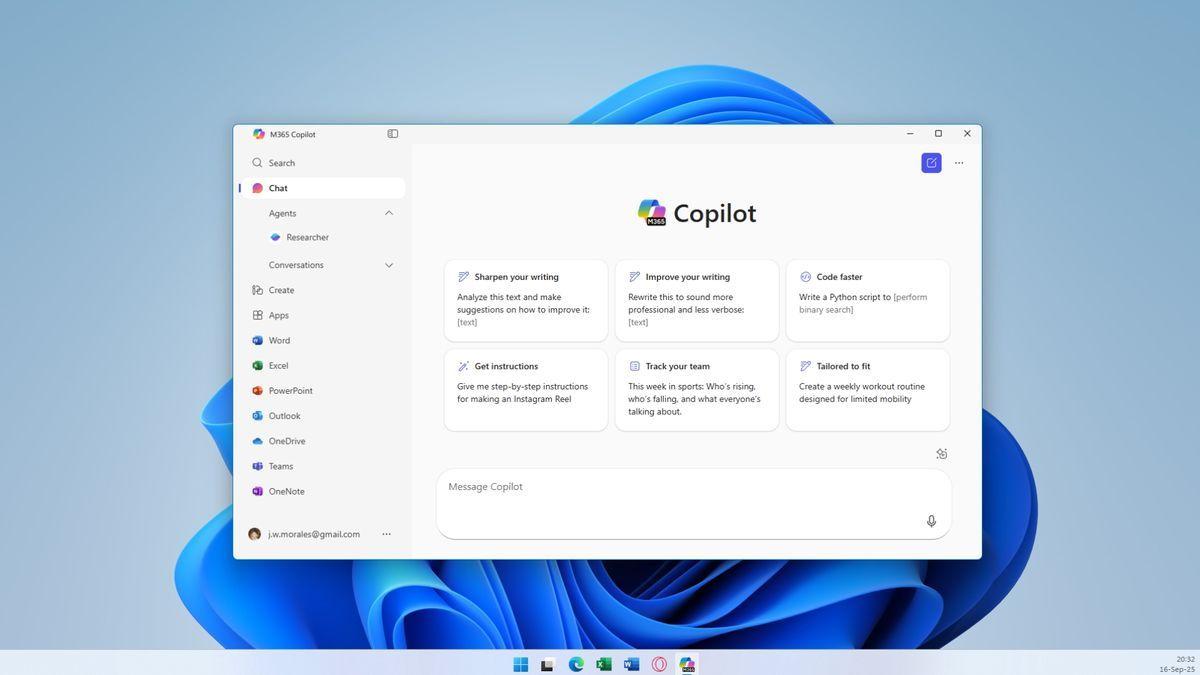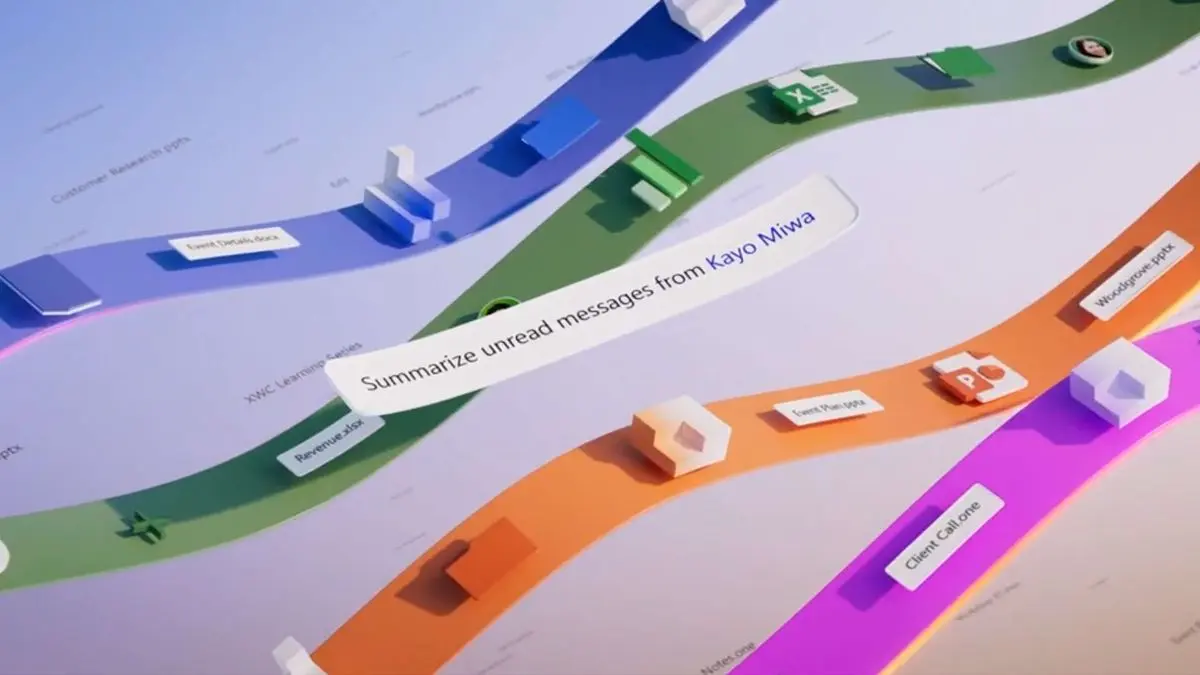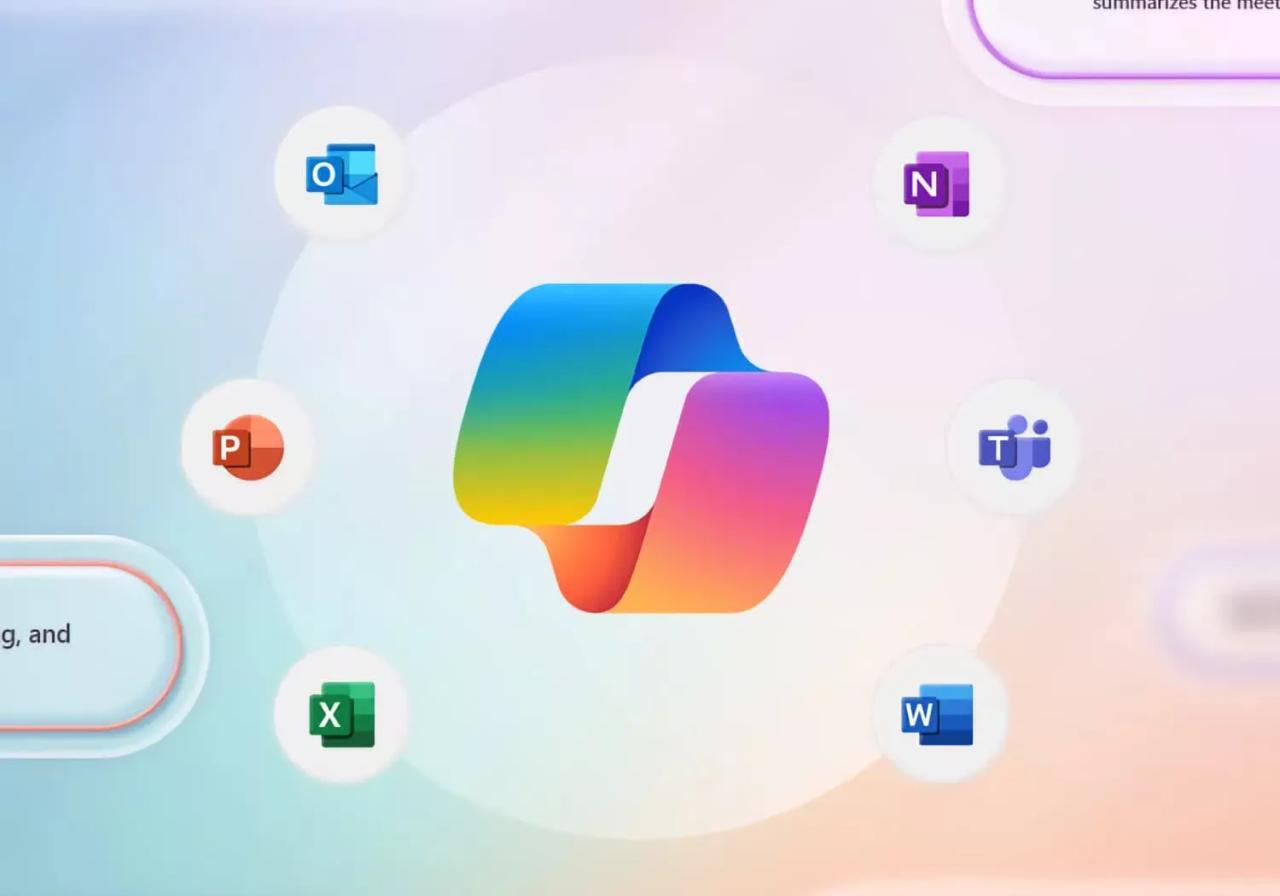Microsoft to Automatically Install Copilot App on Windows Devices with Microsoft 365
5 Sources
5 Sources
[1]
Microsoft Will Automatically Install Copilot App on Windows Next Month
Don't miss out on our latest stories. Add PCMag as a preferred source on Google. Microsoft's Copilot app will soon install itself on all Windows devices with 365 desktop apps onboard. Copilot AI has become a core part of Microsoft's business strategy over the last few years, and it now wants more of its core users to experience what it can do. In a notification sent to users last week, spotted by Bleeping Computer, Microsoft noted how from early Oct. it will automatically install the app on computers with 365 suite apps like Excel, PowerPoint, and Word. An exact date for the rollout is unclear, but it says it'll happen on all compatible devices by the middle of Nov. The company's statement says, "The Microsoft 365 Copilot app helps Microsoft 365 users be more productive by providing a single place to access Microsoft 365 Copilot features and capabilities, including search, chat, agents, and more." The change will see the app added to the Windows Start Menu. However, not everyone wants Copilot on their computer, and there are ways to stop it from automatically installing. Head to the Microsoft 365 Apps admin center on your device. As the name suggests, you'll need to be an admin to follow this process. Then head to Customization > Device Configuration > Modern App Settings. Within here, you'll find an option called Enable automatic installation of Microsoft 365 Copilot app under the Microsoft 365 Copilot app section. Untick this box to stop the process going ahead. The Copilot app is available across Android, iOS, Mac, and Windows, but this change only impacts those on Windows devices. If you want the app to install on your device, Microsoft says you should tell everyone who uses your computer system that it's coming to minimize confusion when it does roll out. That's mostly aimed at business users, but it's also applicable for home use. The change is happening globally, but it won't impact customers in the European Economic Area. That's likely due to AI legislation within the EU, but it may mean the brand follows suit on a rollout there at a later date.
[2]
Microsoft will force install the Copilot AI app for users with desktop versions of 365 apps like Word and Excel -- coming October, with no way to opt out for personal users
Microsoft has announced that it will automatically install the Microsoft 365 Copilot AI app for users who have a desktop version of Microsoft 365 suite apps installed on their system, such as Word, Excel, and PowerPoint. According to BleepingComputer, the rollout will begin next month and is expected to be completed halfway through November, affecting all Windows PCs worldwide, except those in the European Economic Area (EEA). "Starting in October 2025, Microsoft will begin automatically installing the Microsoft 365 Copilot app on Windows devices that have Microsoft 365 desktop client apps," the company said on the Microsoft 365 message center. "This app provides a centralized entry point for accessing Copilot experiences and AI-powered capabilities across Microsoft 365. This change simplifies access to Copilot and ensures users can easily discover and engage with productivity-enhancing features." Unfortunately, it seems that most personal users will have no way of opting out of this feature. But if you're a system administrator, you can opt your organization out of this by disabling the automatic installation of Microsoft 365 Copilot in the Microsoft 365 Apps admin center. This update is part of Redmond's push for the wider adoption of its Copilot AI app. Just this July, the Microsoft Edge browser introduced a Copilot Mode that can interact with your open tabs and find information you're looking for. Furthermore, Microsoft bundled Copilot with the Microsoft 365 subscription, resulting in a 43% price hike. And while this might be a welcome development for those who use AI tools, it will most likely be seen as an annoyance by those who don't use Copilot or AI in general. After all, if you use AI apps and even subscribe to one, you likely already have it installed on your computer. But for those who aren't interested, they will likely just see this as another piece of bloatware that Microsoft is forcing down their throats. The software giant is spending billions of dollars on AI investments, and it likely wants users to start paying for services to recoup some of the cash it spent. However, statistics say that the AI adoption rate isn't going as planned, with large companies reducing their reliance on these tools. It has even gotten to the point that an economist warned of an AI bubble that will be worse than the dot-com crash of 2000 when it bursts. Unless you have an administrator who manages your Microsoft 365 subscription (which isn't true for most personal users), it seems that the only way to avoid getting Microsoft 365 Copilot automatically installed on your computer is to not use Microsoft 365. Otherwise, you'll just have to ignore it and add the app to the list of disabled apps in Windows' Startup.
[3]
Microsoft to force install the Microsoft 365 Copilot app in October
Next month, Microsoft will begin automatically installing the Microsoft 365 Copilot app on Windows devices that have the Microsoft 365 desktop client apps. The Microsoft 365 Copilot app integrates the AI-powered Copilot assistant with Microsoft 365 suite apps, including Word, Excel, and PowerPoint, as well as other features like Notebooks and AI agents. While the newly installed app will be added to the Windows Start Menu and enabled by default, IT administrators responsible for managing Microsoft 365 app deployments will be able to opt out in the Apps Admin Center. Redmond also advised admins to notify their organizations' helpdesk teams and users before the app is forcibly installed on their devices "to reduce confusion and support requests." The rollout will start in early October and be completed by mid-November; however, the Microsoft 365 Copilot app will not be installed on systems within the European Economic Area (EEA). "Starting in October 2025, Microsoft will begin automatically installing the Microsoft 365 Copilot app on Windows devices that have Microsoft 365 desktop client apps," the company said in a Microsoft 365 message center update on Friday. "This app provides a centralized entry point for accessing Copilot experiences and AI-powered capabilities across Microsoft 365. This change simplifies access to Copilot and ensures users can easily discover and engage with productivity-enhancing features." Although many users may notice a new Microsoft 365 Copilot app icon in the Start menu, the application may have already been installed, resulting in no apparent change. Last month, as part of the same effort to make Copilot more easily available, Microsoft announced that it will integrate Microsoft 365 Copilot agents into the Edge sidebar starting in late September 2025, allowing users to access them while using Copilot. Weeks earlier, it added a new setting that allows Microsoft 365 admins to pin the Microsoft 365 Copilot app to the Windows taskbar.
[4]
Microsoft Is Adding More Bloat To Your Windows 11 PC
Summary Microsoft will auto-install 'Microsoft 365 Copilot' on PCs with Microsoft 365 apps from Oct 2025. Duplicates existing Copilot features, uses the same icon and may install automatically without clear uninstall options. EEA users are exempt under the DMA; enterprise IT can block the auto-install via the Microsoft 365 Apps admin center. If you think your PC doesn't have enough bloat, boy do I have some good news for you. If you like Copilot a lot, why not let Windows download yet another Copilot app automatically? Microsoft has announced its plan to automatically install a new "Microsoft 365 Copilot" app on the computers of those with Microsoft 365 desktop apps on their PCs, starting in October 2025. The new app is designed to be a sort of centralized hub for Microsoft's AI-powered Copilot features within the Microsoft 365 ecosystem, which means apps like Word or Excel. According to Microsoft, it will help you with tasks such as finding files related to specific projects, automating repetitive tasks, and accessing other AI-driven capabilities. Copilot features are already integrated into various Office apps, but this standalone app is intended to unify the AI experience across all of these apps. Despite it being a completely optional app (it doesn't add any new functionality as there's already a Copilot component on all Microsoft 365 apps), it's being pushed as an automatic install on users' computers. The company has not yet clarified whether the app will be uninstallable for individual users if they don't want it. For enterprise customers, IT administrators will have the option to block the automatic installation of the Microsoft 365 Copilot app through the Microsoft 365 Apps admin center. Everyone else, though, will have an annoying automatic install coming soon to their computers. It's a bit of a weird one. On one hand, this is a distinct app to the Copilot app, which is a general-purpose chatbot -- this is meant to be an app geared towards using on different Microsoft 365 apps, finding files and data within those files. On the other hand, not only does it seem to be a mandatory install, but it also has the exact same icon as the regular Copilot app. Some users might mistake one app with the other and might get confused when the mistaken app they chose is struggling to perform the actions they need to do. It should be noted that users in the European Economic Area (EEA) will be exempt from this automatic installation. This is a direct consequence of the Digital Markets Act (DMA), a landmark piece of EU legislation designed to curb the power of large technology companies, or "gatekeepers," like Microsoft. The DMA imposes strict rules on these companies, prohibiting them from engaging in anti-competitive practices such as forcing users into their ecosystems. Under this rule, Microsoft can't really install apps without asking you first. If you haven't gotten this app yet, you likely will soon. Fun stuff indeed. Source: Windows Latest
[5]
Microsoft announces it will automatically install the Copilot AI app alongside desktop versions of 365 products like Word, Excel and PowerPoint this October -- and it seems like there's no way for personal users to opt out
I've found that Microsoft Copilot splits opinion pretty evenly, in my casual conversations with unfortunate members of the public. While many begrudge the addition of AI tools into their daily lives, some find it very useful for summarising documents and spreadsheets, and helping them out with the odd bit of busywork. Well, that last group should be particularly pleased with Microsoft's latest Copilot announcement, as the app is said to be installing alongside most desktop versions of Microsoft's 365 suite of apps next month -- whether you like it or not. "Starting in October 2025, Microsoft will begin automatically installing the Microsoft 365 Copilot app on Windows devices that have Microsoft 365 desktop client apps," says MS in a message center update, according to Bleeping Computer. "This app provides a centralized entry point for accessing Copilot experiences and AI-powered capabilities across Microsoft 365. This change simplifies access to Copilot and ensures users can easily discover and engage with productivity-enhancing features." System admins can prevent the automatic install, but it looks like there's currently no way for personal users to do the same -- although systems inside the European Economic Area appear to be excluded from the update. Still, I hope the rest of you MS 365 users are ready to engage with some AI-based productivity enhancement, because it looks like the app might be heading your way regardless. You may have seen this coming, given that Microsoft rebranded the 365 app to the "Microsoft 365 Copilot app" at the start of the year, but nevertheless, here we are. Microsoft seems to have been on a big push in recent months to integrate Copilot into all and sundry, including pushing it into Microsoft Edge as an "experimental feature" back in July -- although for what its worth, it was purely an opt-in or opt-out affair. I can't imagine that the latest announcement of the app's forced installation will go down well with Microsoft 365 users, as they've already had to contend with a 43% price hike as a result of its inclusion in Personal and Family plans earlier this year. It's also not exactly the sort of behaviour that inspires goodwill towards a new feature, is it? I would say that if your userbase really, really wants a product, you don't necessarily have to force it on them -- and I'd also posit that this sort of mandatory installation technique doesn't speak well of Copilot's adoption among users as a whole. Still, you get a whole 15 AI credits per month with the subscription, so if you're the sort of person who finds Copilot useful, this might not be particularly big news. For those of you who simply want to type the odd document and view the odd spreadsheet free from AI-involvement, though, and without Microsoft's AI app cluttering up your machine, it's a pretty bum deal. Is this the point where I mention that the completely-free LibreOffice alternatives to all these 365 apps exist, and they're actually pretty good? Yep, I thought as much. Do with that information as you will.
Share
Share
Copy Link
Microsoft announces plans to automatically install the Microsoft 365 Copilot app on Windows devices with Microsoft 365 desktop apps, starting October 2025. The move aims to centralize AI-powered features but raises concerns about user choice and bloatware.
Microsoft's Copilot Integration Push
Microsoft has announced plans to automatically install the Microsoft 365 Copilot app on Windows devices that have Microsoft 365 desktop client apps, starting in October 2025
1
3
. This move is part of the company's broader strategy to integrate AI-powered features across its product lineup and increase adoption of its Copilot technology.
Source: How-To Geek
The New Copilot App
The Microsoft 365 Copilot app is designed to be a centralized hub for accessing AI-powered capabilities across the Microsoft 365 suite, including Word, Excel, and PowerPoint
2
. It aims to simplify access to Copilot features and ensure users can easily discover and engage with productivity-enhancing tools1
.
Source: Tom's Hardware
Rollout and Implementation
The automatic installation is scheduled to begin in early October and be completed by mid-November 2025
3
. The app will be added to the Windows Start Menu and enabled by default. However, it's worth noting that the app may already be installed on some systems, resulting in no apparent change for those users3
.User Choice and Opt-Out Options
For personal users, there appears to be no way to opt out of this automatic installation
2
5
. However, IT administrators in enterprise settings can disable the automatic installation through the Microsoft 365 Apps admin center1
3
.Regional Exceptions and Regulatory Considerations
Notably, the automatic installation will not affect users in the European Economic Area (EEA)
2
4
. This exemption is likely due to the Digital Markets Act (DMA), an EU legislation designed to curb the power of large technology companies and prevent anti-competitive practices4
.Related Stories
Concerns and Criticisms
The forced installation has raised concerns among some users and tech commentators. Critics argue that this move adds unnecessary bloatware to Windows systems and limits user choice
4
5
. There's also confusion about the distinction between this new app and the existing Copilot app, as they share the same icon4
.Microsoft's AI Investment and Strategy
This move is part of Microsoft's broader strategy to recoup its significant investments in AI technology. The company has been integrating Copilot into various products, including the Edge browser, and has increased prices for Microsoft 365 subscriptions that include Copilot
2
5
. However, some analysts warn of a potential AI bubble, comparing it to the dot-com crash of 20002
.
Source: PC Gamer
References
Summarized by
Navi
[3]
[4]
Related Stories
Microsoft to Auto-Install Copilot on Microsoft 365 Devices Starting Fall 2025
16 Sept 2025•Technology

Microsoft Integrates Copilot AI into OneDrive for Web, Raising Privacy Concerns
21 Mar 2025•Technology

Microsoft Bundles Copilot with Office 365 Subscriptions in Select Markets, Raises Prices
08 Nov 2024•Technology

Recent Highlights
1
Google Gemini 3.1 Pro doubles reasoning score, beats rivals in key AI benchmarks
Technology

2
Meta strikes up to $100 billion AI chips deal with AMD, could acquire 10% stake in chipmaker
Technology

3
Pentagon threatens Anthropic with supply chain risk label over AI safeguards for military use
Policy and Regulation





